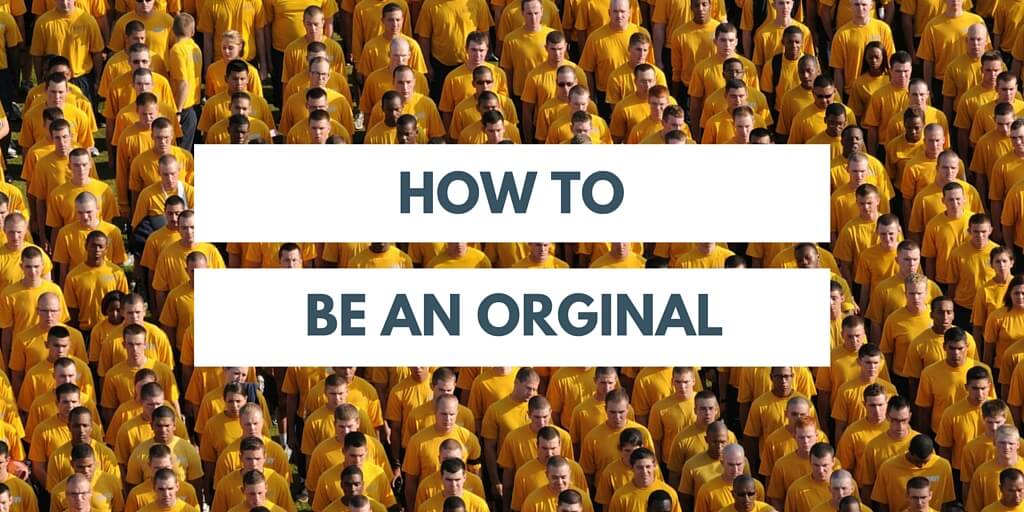What does it mean to be exceptional?
Successful and exceptional are not synonymous. You can be successful without having particularly remarkable ideas. You can be successful without being phenomenal. In some business cultures, success is defined by satisfying the status quo and only doing what’s expected, no more and no less.
But for more and more companies that level of achievement is old hat. Businesses don’t want decent; they want dynamic. They don’t want adequate; they want amazing.
Look on the cover of any business magazine. What do you see? Inventors. Innovators. Improvers.
Today’s business success stories are the ones that stand out from the crowd. The order of the day is to be unusually good, to be better—much better—than average, to be the company or the person outperforming the rest.
To be mediocre, lacking in ingenuity and creativity, is to be neither hirable nor promotable. What employers, clients and investors want today: An original.
Recently, I watched Adam Grant’s TedTalk “The Surprising Habits of Original Thinkers.” Grant is is a top-rated professor at the Wharton School at the University of Pennsylvania. As an organizational psychologist, he studies how leaders champion new ideas and fight groupthink. He calls these people “originals.” His book, Originals, has become a New York Times bestseller and offers insight into how to be more like the people who reject conformity.
One of the most revealing segments of Grant’s presentation is about the benefits of procrastination. Grant says that he’s not a procrastinator at all. In fact, he identifies as a pre-crastinator, which he demonstrates by telling the audience that he finished his senior thesis four months before the deadline. As a graduate school professor, though, Grant had seen more than his share of students who’d said, “I have my best ideas when I procrastinate!” So he decided to test the theory for its accuracy. What he discovered: There’s a procrastination sweet spot—it’s not pre-crastination but it’s not all-out procrastination of the last-minute kind either.
In the sweet spot, procrastination becomes what Grant calls “incubating.” It’s when you’re given an assignment or instructions to work on a task, but you temporarily delay completing the task. Instead of pumping it out right away, you spend time doing other unrelated things (say, playing minesweeper or browsing Facebook for a bit) while the task is still in the back of your mind. All the while you’re ”incubating,” you’re breeding creative ideas by exposing yourself to something that’s unrelated to the task. As for how this kind of procrastination ends up encouraging originality, Grant explains:
“Procrastination gives you time to consider divergent ideas, to think in non-linear ways, to make unexpected leaps.”
Grant goes on to quote Aaron Sorkin, the award-winning screenwriter and television czar, who said, “You call it procrastinating. I call it thinking.”
At this point, you might be wondering: Why I, an accountant, would be interested in originality and creativity.
To answer that, I’ll refer to a great article, “8 Things Exceptional Thinkers Do Every Day,” which appeared this month on Entrepreneur. In it, the writer Matt Mayberry asserts, “ Every great achievement in history came from exceptional thinking. Every man or woman to ever rise to the top of their profession had exceptional thinking that played a major role in getting them to where they are.”
A high level of thinking is required to be at the top of any field. Sure, there will always be formulas and boxes to check off and rules to follow, and you’ve got to know the rules in order to break them (as every English teacher you’ve ever had probably told you at some point in your academic career).
`But in today’s workforce, there’s a new call to action to refine and rise, to overcome the status quo with ingenuity. That level of self-innovation doesn’t come without doubt or insecurity. (In this case, borrow this philosophy from Grant: “Instead of saying ‘I’m crap.’ Say: The first few drafts are always crap and I’m just not there yet.” Original thinking doesn’t happen without having bad ideas—a lot of bad ideas. Original thinking doesn’t happen without fear. In fact, Grant says that originals are afraid of failing, but they’re more afraid of failing to try.
Take a few moments today to be an “original.” If you’re not sure how to begin, look at something you’ve seen many times before (your resume, your email inbox, that status report for your boss that you always write the same way each month), and see it with fresh eyes.


